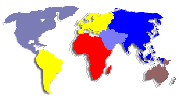|

Ohne die Erweiterung zur Europäischen Währungsunion kann die EU nicht erfolgreich sein.
Arno Tausch: Für ein gemeinsames €uropa. Argumente aus der Sicht des “Globalen Keynesianismus” 
Reshaping The International Financial Architecture For Balanced And Stable Growth / Keynote Address by the Prime Minister of Malaysia, Dato Seri Dr. Mahathir Mohamad, at the
Inauguration of the Islamic Financial Services Board 
Luiz Inácio Lula da Silva`s Brazil: Financial cross double bind with JP Morgan Chase and partners - James K. Galbraith on “The Larger International Monetary Problem” 
Sovereign Debt Workout Arrangements / By Kunibert Raffer, University of Vienna 
Staatliche Schuldenregulierung: Verfahren und mögliche Inhalte / Ein Gutachten für das Bundesministerium für Wirtschaftliche Zusammenarbeit und Entwicklung 
IMF Updates and Patches: Mrs. Krueger`s software is approaching Microsoft standards 
Joseph Stiglitz in FT: The disastrous consequences of instability 
Foreign Affairs September / October 2002: Bush and the World / By Michael Hirsh 
A Contribution to an Online Discussion on Sovereign Debt Restructuring 
Moderated by the European Network for Debt and Development
A Letter By Thomas C. Dawson, Director, External Relations Department International Monetary Fund, February 7, 2002
Short Reply by Kunibert Raffer on request by DAD 
Solving Sovereign Debt Overhang
by Internationalising Chapter 9 Procedure* 
Working Paper by Kunibert Raffer

Argentina: test case for a new approach to insolvency? / By Frederick W. Engdahl (January 5, 2002) 
The Bretton Woods-GATT System: Retrospect and Prospect After Fifty Years 
Margaret Garritsen de Vries: The Bretton Woods Conference and the Birth of the International Monetary Fund 
Edward M. Bernstein: The Making and Remaking of the Bretton Woods Institutions 
Andre Gunder Frank:
Überdehnung der US-Ökonomie & Militärisch-Politischer Rückstoß? 
Im Schatten der Derivate - Buchankündigung 
Von Exuberance zu Protuberance
Negativer irrationaler Überschwang und spekulativer Empirismus / von Georg P. Christian
Man muß sich nicht wie ein Guru vorkommen, um die Voraussage zu wagen, daß der 20. Dezember 2000 in die Finanzgeschichte eingehen wird – als der Tag, an dem »die Märkte« über die
Blase, deren Aroma sie so lange gierig geschnüffelt haben und deren Binnendruck ihnen mitunter schon Ohren und Nasen zu verstopfen schien, von immerwährender Betörung zunächst
einmal in den Zustand der Verstörung übergegangen sind. 
Die Schwankungsanfälligkeit des IWF-Systems
Ein Bericht von Georg P. Christian
Im Jahr 1988, zur Herbsttagung des Internationalen Währungsfonds und der Weltbank in Berlin, hatten sich die Studien von Zeitfragen letztmals ausführlich mit »Fakten zur
Schuldenkrise«, mit »Kampagne und Gegenkongreß« sowie mit der Enzyklika Johannes Pauls II über die “Strukturen der Sünde” befaßt. (Heft 3/1988). Der Bericht schlägt die Brücke zwischen
den Umwälzungen Ende der 80er Jahre zum derzeitigen Zustand des Weltwirtschaftssystems. 

Hedge Funds, Asian Crisis and Japan
In all today, there are some 3,000 registered trading entities called hedge funds, with an estimated equity base of some $200 billions, according to Hedge Fund Research, Inc., a hedge fund
analyst. Of these, less than half a dozen regularly engage as conscious strategy, in high-risk, politically-targetted attacks on vulnerable currencies or markets. While these »global macro«
hedge funds, as the latter are often called, often operate out of offices in New York or other US cities, none of them are »American« in any real sense. The management office may be in
New York, but the legal corporation is hidden away, offshore, far away from the prying eyes of US or other tax authorities, in places such as Netherlands Antilles or Cayman Islands. Further,
to avoid any legal scrutiny from US authorities, these global macro funds permit only non-US citizens or non-US institutional investors to join the equity share of the fund, usually European
or other foreign banks. It's all completely unregulated and highly secret. 

Japan Inc. in the Debt Trap
With the Yen so dangerously high that it hurts export profits, the only sector of profit in the ailing economy, Japan is precisely
where the Euroland powers want the second largest industrial economy to be for now. At anytime it suits Euroland financial powers, they can now pull the plug on Japan by forcing the Yen
even higher, against the Euro. European exports already are far more competitive against Japanese in the past 15 months in world markets. Euroland is intent on eliminating Japan as a
future competitor. It is dangerously close to its goal, helped enormously by the cultural paralysis of the internal Japanese crisis since the collapse of Cold War structures. In this context, a
qualitative rethinking of American-Japanese relations is of urgent interest. 
The World Bank and Japan:
How Godzilla of the Ginza and King Kong of H Street Got Hitched / By Edith Terry
Japan Policy Research Institute Working Paper #70 (August 2000)
Buried in news about the anti-globalization protests, a major theme of the annual spring meeting of the World Bank and IMF in April 2000 in Washington DC, was the Japanese demand for a
larger voice for itself and other Asian nations. As protesters stormed the barricades outside, a senior Japanese official told the New York Times, »There's a sense that this has always been
a white man's club, and that needs some rethinking« (April 17, 2000). 
IMF revisits the scene of the crime
Unless East Asia faces up to the fact that the Asia financial crisis, given the policies and business practices of the decade
preceding it, was inevitable and had best be viewed as salutary and an opportunity for in-depth reform, there will be an early recurrence. The IMF's new managing director, sweet-talking
Horst Koehler, does no one a favor by listening to people (and governments) talking self-serving nonsense. 
 |



